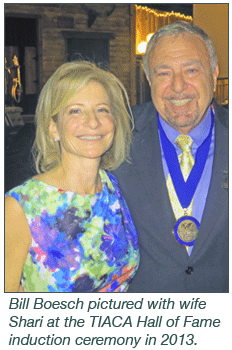William R. Boesch is an air cargo pioneer, and also an accomplished
leader across a distinguished and exemplary 50 years’
career. Bill served as President of American Airlines Cargo, which
he prominently put on the world stage during the era of Robert Crandall,
the inventor of the Frequent Flyer programme. Crandall and Cargo were
sitting either side of the aviation chessboard, while Bill Boesch
was trying his luck with the belly space.
A key logistician for U.S. military forces, Bill Boesch later created
methodologies in transportation that delivered the goods, while saving
lives during the Iran and Iraq conflict. For his efforts Bill was
awarded The Medal of Freedom at a ceremony on Ellis Island in New
York harbour, in the shadow of the Statue of Liberty.
Impossible to give a complete recount of the prestigious, decisive
positions which Bill held in his long and inspiring career, suffice
it to say that he is (or was, accordingly) a key player for Seaboard
World Airlines, Pan Am, American Airlines, Emery, DHL Global Mail
and the U.S. Dept of Defence, whereas he also founded and continues
to lead today the Council for Logistics Research, Inc. We suspect
he was also the mastermind behind the Flying Tigers’ feat.
FlyingTypers did not
pass the chance to exchange views with Bill and what follows is an
abstract of their recent conversation. Speaking of abstracts, here
is an interesting element to explain why we were so interested in
exchanging views with Bill Boesch: this is part of the WIPO
Patent for tracking and logistics management system that Marconi
and Envirotainer obtained on Oct 11th 2001. The application was dated
April 4th 2001, following U.S. documentation dated April 4th 2000.
 |
 We
know from Bill Boesch that, in addition to Envirotainer, he also
served on the Board of Directors of Air Cargo Incorporated, Air
Cargo International, The International Air Cargo Association (TIACA),
Deutsche Post Global Mail, Smart-mail, DHL Global Mail, and Al Seqir/Falcon. We
know from Bill Boesch that, in addition to Envirotainer, he also
served on the Board of Directors of Air Cargo Incorporated, Air
Cargo International, The International Air Cargo Association (TIACA),
Deutsche Post Global Mail, Smart-mail, DHL Global Mail, and Al Seqir/Falcon.
In this regard though, more
importantly he was one of the four inventors of the patented system
referenced in the above source. Today we are familiar with aviation
security, the powerful engine which drives tracking and tracing
and total logistics management. Reading the text of the abstract
in 2021 is a no brainer, these concepts sound totally obvious to
us. However, the inspiring personalities that could see the picture
in 2000, so far as to imagine what was to become of air cargo, were
not many before 9/11. Kudos to William R. Boesch for that.
Both Bill and I have
learned in our lives how unpredictable the future is, but it is
nonetheless legitimate to try and figure out what is at stake, with
a bit of imagination and, perhaps more importantly, 50 years’
experience on your shoulders.
GA: Bill,
I have always been fascinated by the way you went to the top of
the aviation industry, even though you have been more involved in
air cargo, not the first choice for many airline professionals I
daresay. Can U.S. airlines make money with air cargo in your view?
WB: The
U.S. passenger carriers’ main strategy has been to be the
biggest and have the highest market share. Their schedules and their
frequent flyer games were based on that, their growth plans ensured
they had resources, capacity and flights as needed on each route
at different times, so their frequent flyer customers never had
to use another airline. Cargo was considered a by-product in the
end. This strategy only works when the economy is flourishing. With
declining figures, carriers cannot shed their fixed costs and start
suffering. New, lower cost carriers enter the market: a situation
we have often seen over the past 50 years, roughly in 10-year cycles.
With lower profit margins than other industries, airlines have never
been a good long-term stock buy.
Bob Crandall, the former chairman and president
of AMR/American Airlines, had a sign on his desk which said: “If
God meant people to fly, he would have made it profitable”.
Bob Baker, who ran the successful operation at AA, felt that airlines
had a hard time to show a good long-term profitability because of
their unions, but I believe that the problem was not the unions,
as much as the airlines just had the wrong long-term strategy at
that time.
GA: That
is quite a statement, Bill. What would you suggest instead? Would
you suggest a more balanced approach between passengers and cargo?
WB: Well,
let us first review the passenger side. Fortunately, some airlines
are abandoning the old strategy and are now looking at different
long-term profit schemes. The Coronavirus pandemic was the straw
that broke the camel’s back I believe: it is impossible to
predict the future with 100% certainty, no matter how good or accurate
the data, but predicting the impact of a pandemic before you are
right in the middle of it is next to impossible. Passenger airlines
and aircraft manufactures got it wrong when the A380 and the B747-8
and B780 were introduced into the market, against all figures; we
all know that now, but twenty years ago that seemed to make sense.
On the passenger side there are just
three types of long-term profit strategies. 1.
Utilizing more narrow body aircraft on domestic and
international routes.
2. Limiting
widebody international aircraft to major hubs overseas and using
international partnership agreements to move passengers to their
final destination.
3. Is
a combination of the first two. Much, of course, depends on the
strength of the partnerships.
GA: Well,
Bill, you say the pandemic and the A380 taught us a lesson, did
they really?
WB: U.S.
business travel is expected to only recover to approximately 70%,
at least initially, as virtual meetings are just too convenient
for businesses. Hence U.S. airlines will try to increase their percentage
of leisure travellers and improve their business class accommodations,
targeting the reduced number of higher paying business travellers
by flying more single aisle aircraft internationally. That is why
Boeing is considering upgrading its 757 to compete in this emerging
market. The result will be less belly space for cargo overall, as
leisure travellers tend to check their bags, particularly if they
fly far away.
Over the past two decades the passenger
carriers moved about 60% of the international air cargo and treated
it as incremental on-demand business with “capture pricing”.
The predicted result of less passenger aircraft belly space is good
news for the air cargo freighter market, and the end result may
be that only as much of 40% of the world’s international cargo
business will travel as belly cargo in future.
GA: This
will push cargo prices upwards even higher, or is something else
at play here?
WB: Cargo
rates are at an all-time high and are not expected to be lower until
sufficient belly space returns on passenger aircraft. As noted previously
belly space is just starting to rebound. The major freight forwarders,
who are the prime users of belly space, are seeing this trend and
are forming partnerships for either ACMI or CMI leases to ensure
access to capacity and stable pricing. The results could mean a
consolidation within the air forwarding companies, with bigger ones
surviving and smaller ones being absorbed or finding a sustainable
niche. It is a never ending story, as you well know.
GA: We
know only too well that air cargo cannot rely on freighters alone,
so what do you see happening?
WB: The
air cargo industry has four primary business models for using freighters.
They are scheduled service, e-commerce, integrator, and non-schedule
charter operators.
According to credible sources, the
global air cargo services market is expected to grow from $56.48
billion in 2020 to $64.98 billion in 2021 at a compound annual growth
rate (CAGR) of 15%. Most experts are predicting the market to reach
$99.67 billion in 2025 at a CAGR of 11%. If these predictions are
accurate, then air cargo will grow approximately $9B a year (or
14% per annum) through 2025 with at least 60% of the volumes moving
on freighter aircraft.
Markets supported by integrator carriers
are expected to grow 20%, the e-commerce companies will grow 25
to 30%, the scheduled freighter operations may grow 10%, and ACMI
contracts are becoming the vehicle of choice with the major airfreight
forwarding companies.
One major change affecting the cargo
industry is that the ACMI/CMI lessors want to renegotiate their
rates yearly, while most major ACMI lessors are insisting on five-year
leases at a higher margin, with the present shortage of freighters.
This, coupled with a possible slowdown in U.S. foreign trade and
a continued strained U.S./China relationship during which China
grows its own freighter fleets, could mean the U.S. cargo carriers
will be at the bottom of the “totem pole” and in serious
trouble, if their fleets are not covered by ACMI/CMI leases.
Looking at the U.S. freighter and on order
conversions and new freighters, most are going to the integrators
and the e-commerce companies, which will dominate the air cargo
freighter market in the near future.
 |
There are other elements at play
in this day and age that we in the U.S. could once upon a time consider
less important. China is rapidly becoming the largest market in
the world in all segments and air cargo is probably next in line.
Europe is probably less likely to grow at the same pace, but my
take is that Africa will come next with exponential demand in cargo.
Let us not forget that 13 out of the 20 largest cities in the world
will be in Africa in 2100 and the other 7 in Asia, none of them
in China. America and Europe are out of this picture. It is not
happening overnight, but demographics rarely fail and this model
in eighty years’ time is completely different from today’s
model. We must wait and watch what this kind of future will bring.
In the meantime, let me thank you
for the insight you have given us, which will be extremely interesting
for our readers. Let me wish you all the best in your current endeavours
that are so important for our nation. |




